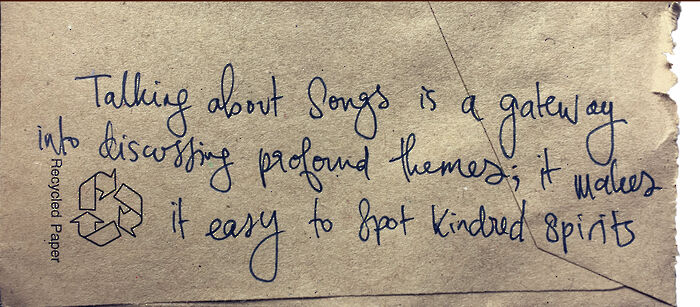A sonic youth: every melody a memory
Continuing her personal exploration into how music influences our Cambridge years, columnist Anna Mochar highlights the power of memory

Hearing a song we used to love at some point in our lives is always a bit strange. Perhaps we’d completely forgotten about a track for years and wouldn’t be able to recognize it by its title; but as soon as it’s played, we find ourselves singing along. Lyrics that had been buried and long thought forgotten come to our lips without any difficulties. And with those lyrics comes a piece of who we were when we first (obsessively) listened to this particular song. Music can, thus, become a store for memories and feelings.
During my time in Cambridge, the hours I spent listening to music while walking around town or working in the library have led to many songs being infused with memories from different points of my first year. My past year can perhaps be best understood in terms of the playlists I made to fit the vibe of each month or feeling. Looking back through these playlists is interesting, in that I can so vividly recall the feelings that they’re associated with.

Take, for example, a long weekend spent in Milan with my friends during the Easter vacation. For me, this trip is inextricably linked with Joan Baez. Any time I now listen to her song, ‘Mary Call’, I am taken back to hours spent on the night-train, and making coffee in the kitchen of our cosy Airbnb.
It’s funny how music works like a scent when it comes to recalling memories. Very particular, inexpressible thoughts and emotions pass through our minds when we hear familiar songs. Music, perhaps more immediately than other art forms, becomes personal when we consume it. This happens in a way that transcends the artist and their intentions when creating a song: it becomes our own in a way. A personal soundtrack. This is particularly true when we create and curate playlists for different moods and times in our lives.
Naturally, however, we must ask a difficult question. Seeing as the music we listen to is so closely tied to our feelings and memories in ways that can defy analysis, is there any way of extricating music from memories? And is there even any point in doing so, or should we appreciate the fact that memories of a term or academic year can be stored in a three-minute song?
The music I listened to while going through rollercoaster moments of stress, excitement, happiness, or sadness interacted with and continues to interact with those feelings. It’s like an apothecary’s shelf of bottles: each playlist or song is a cure for (or enhancement of) certain emotions. Feelings of nostalgia and a sudden realisation of the fact that I’m moving further and further away from my childhood were echoed in songs like ‘0043’ by Wanda or ‘Boys in the Trees’ by Carly Simon.
Listening to songs that are in this way connected to memories of my first year in Cambridge is a way of placing myself back into the context - the moment and place where they were important to me. I’m directly put back in touch with who I was and reminded about how I may have changed.

Sometimes the time comes to let go of songs, albums or even artists, as the memories can be too overwhelming. Deleting an album from our Spotify library may seem pretty trivial, but when we think of the underlying feelings and issues associated with it, suddenly a seemingly insignificant action like this becomes impactful and powerful. We are giving ourselves the opportunity to symbolically cut ties with the past.
On the flipside, however, I have found that it is possible to rehabilitate music for myself. Due to the intense personal connections that we can form with a piece of music, we also have the ability to breathe new life into our enjoyment of a song by actively changing our associations with it. If, for example, somebody who we’re no longer on good terms with first introduced us to an artist or song, it can be easy to only view the music as it stands in relation to them. We can, however, forge new memories to associate with songs, finding something in the music that belongs to us alone, and which is independent from other people.
As time passes by quickly, it can be nice to revisit certain times from the past year by listening to songs that were, even if only for a short time, my favourite. “Komm schlaf bei mir” by Ton Steine Scherben, though I only intensively listened to it for a short time, reminds me of working in the window seat of my old college room. This is an example of how music can almost be seen as a way of curating and organizing memories – and it’s wonderful to think that an everyday action like listening to music gives us the power to do just this.
 Comment / Cambridge’s tourism risks commodifying students18 April 2025
Comment / Cambridge’s tourism risks commodifying students18 April 2025 News / Cambridge researchers build tool to predict cancer treatment success19 April 2025
News / Cambridge researchers build tool to predict cancer treatment success19 April 2025 News / Varsity ChatGPT survey17 April 2025
News / Varsity ChatGPT survey17 April 2025 News / Cambridge researchers find ‘strongest evidence yet’ of life on distant exoplanet18 April 2025
News / Cambridge researchers find ‘strongest evidence yet’ of life on distant exoplanet18 April 2025 News / Greenwich House occupiers miss deadline to respond to University legal action15 April 2025
News / Greenwich House occupiers miss deadline to respond to University legal action15 April 2025






